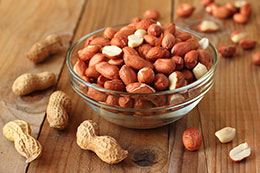16 August 2016
 Research undertaken by the University of South Australia has shown that eating peanuts everyday can improve cognitive function including some aspects of memory and information processing.
Research undertaken by the University of South Australia has shown that eating peanuts everyday can improve cognitive function including some aspects of memory and information processing.
The research project, led by UniSA’s School of Health Sciences including Associate Professor Alison Coates and recently published in Nutritional Neuroscience, involved participants eating 2-3 handfuls of Australian peanuts a day for 12 weeks.
“In the nut world, looking at cognitive function is still quite new,” Assoc Prof Coates says.
“This is the first study that has been undertaken with Australian peanuts – which have a similar profile to olive oil in that they have a higher content of mono-unsaturated fatty acids – even though they are a legume and not a nut.
“After 12 weeks of eating 2-3 handfuls of unsalted peanuts with skins a day, our study participants had noticeable improvements in their cognitive function and an increased ability of blood vessels in the brain to respond to stress.
“This is great news in a time where we are seeing an increase in dementia as well as a link between diminished cognitive functioning and heart disease.
“This is amazing data but it’s just the first step in investigating how nuts are beneficial for our brains.
“The next step will be to undertake further research but with a lower dose of peanuts as 2-3 handfuls of peanuts a day is quite high – it varied between 56-84g a day for our participants – and 30g is generally the recommended daily serving for adults.
“Peanuts are quite high in calories and we were worried about weight gain but the average weight gain was only half a kilogram over the 12 weeks – likely because the participants were replacing some of their normal snacks with peanuts but other factors could be that they stayed fuller for longer on the peanuts and that the mono-unsaturated ‘good’ fat in the peanuts is not completely digested in the gut.”
The research was funded through a grant from the Australian Research Council in partnership with the Peanut Company of Australia who provided the peanuts for the study participants.
Assoc Prof Coates is now recruiting for her next study, this time focusing on the cognitive and cardiovascular benefits of almonds for middle-aged and older adults. Anyone who lives in Adelaide who is interested in being involved with the 12-week almond study can contact Assoc Prof Coates on 8302 1365 or email sansom.researchvolunteers@unisa.edu.au.
“We want to examine health-promoting lifestyle and dietary strategies that may reduce the risk of and improve the management of chronic disease such as dementia and cardiovascular disease,” Assoc Prof Coates says.
Contact for interview: Associate Professor Alison Coates office (08) 8302 2313 email alison.coates@unisa.edu.au
Media contact: Katrina McLachlan office +61 88302 0961 mob 0414 972 537 email Katrina.mclachlan@unisa.edu.au



